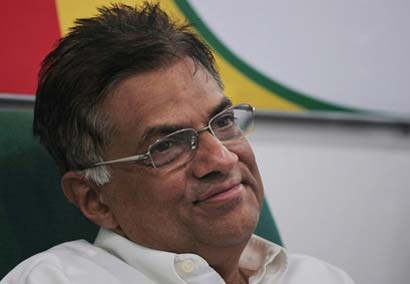Sri Lanka elections not free and fair: opposition

COLOMBO (AFP) – On the eve of Sri Lanka’s parliamentary elections, the main opposition accused the ruling party Wednesday of campaign abuses and said it did not expect polling to be free and fair.
The opposition United National Party (UNP) said President Mahinda Rajapakse’s administration had used state-owned vehicles and buildings for campaigning and turned the government-run media into a party mouthpiece.
“There was a suppression of private media. Journalists were attacked and abducted by those connected to the government,” UNP leader Ranil Wickremesinghe told reporters in Colombo. “Editors were arrested and intimidated.”
He said the state-run media had carried out biased reporting to favour Rajapakse’s United People’s Freedom Alliance.
“Some people feel that there is no point in voting Thursday because their votes will not make a difference due to rigging,” Wickremesinghe said. “We appeal to the people to go and vote. Please. There is an opportunity to change the government.”
He accused the police of failing to implement election laws and favouring ruling party candidates, a charge already denied by the authorities.
Elections Commissioner Dayananda Dissanayake has gone on record as saying the police and public servants had ignored some of his directives to ensure a fair poll.
Political observers expect the president’s party to secure an easy majority on Thursday, following his resounding victory over the combined opposition candidate at the January 26 presidential polls.
The opposition is challenging Rajapakse’s re-election in the Supreme Court.
District officials said most of the 100,000 public servants conducting the vote began fanning out to 11,000 polling booths across the country on Wednesday.
Military officials said nearly 20,000 troops had been called to reinforce police security on Thursday, which marks the first parliamentary polls since last year’s defeat of Tamil Tiger rebels.
A total of 7,620 candidates from 36 political parties and 10 independent groups are in the running for the 225 seats up for grabs under a proportional representation system.
Latest Headlines in Sri Lanka
- Sri Lanka and United States discuss Economic Support and Reforms April 19, 2024
- Israeli missile strikes Iran amid escalating Middle East tensions April 19, 2024
- President says he will build a Sri Lanka that the youth aspire to April 19, 2024
- NPP presents 7-point pledge on Easter Sunday Attack to Cardinal Ranjith April 18, 2024
- Dialog Axiata to acquire Bharti Airtel’s telecom operations in Sri Lanka April 18, 2024



Ow ban Ranil ! Apita owain wedak naha, Umba ohee Kasa Kasa nida ganin thawa awrudu haya-hathak !
Moo dammama nahayen andanda patan aran wage! Thawa ree wenakota kohoma thiyeida!
Dear Mr,Ranil.
OYA ALWAYS JANDAYAK TIYANA WELAWE KIYANAWANE HORA JANDAYAK KIYALA, EHEMANAM OYALAGE PARTY EKA JANDE ELLANNA EPA. NIKAN ENNA.
Dear Mr Wickremasinghe,
When the UNP was in power, they did the same thing. It is best to bring a new law which says that when Parliament is dissolved, all MP’s, Ministers, State Corporation bossess and Permanent Secretaries be placed in protective custody in Boosa until the elctions are concluded.
Paradena Eka Dana Dana Anga Beerahanna Monwa Hari Chodhana Wak Ellakaranna Epaya neda. Nthatham Guti kanna Wei Thamanga Pakshaye Ayagenma. Gamakata Gihin Govithan Bathak Karagena Inna Ranil Ayye.Pacha haluwa Athi….
Umbata oya tharma unee naha !